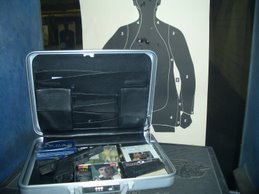Fortunately for me, I was “visiting” a country that had a magnificent beach, which cut out most of the vehicles, chickens and fumes but not the machetes. Like most countries I work in, this one had long suffered a heinous civil war chock full of more atrocities than you could wag an Amnesty International finger at. While this is very troubling from a human rights perspective, it was also troubling for my jogging routine: war refugees swamped the city and used the beautiful white beach as their mass toilet. So, add multi-colored feces and gagging stench to my hop, skip and jump routine.
One morning I was running along in a vain attempt to keep my Nikes clean, and saw a small crowd of people huddled over something that had washed up on the shore. As I neared and elbowed my way into the crowd to get a view of the spectacle du jour, I was appalled, even by my cynical standards. Wrapped up in a filthy cloth was the body of a small child. Most of its organ were missing. It’s chest cavity was empty, and filling up with sand with every lapping wave.
The child was clearly the victim of ritualistic killing and cannibalism. It was done by one of the old secret societies that still penetrate the highest ranks of the country in question. The highest ranks. Probably even my boss’s boss.
It’s time like these when you need Erik Satie.

As Satie once said: "More fun than being bitten by a monkey!" Satie was a fabulous anarchist who lived and died by the piano in Paris during the turn of the 20th century. He was the proto-Dadaist and ancient (by Rolling Stone standards) ancestor of punk rock. Largely overlooked during his life, he lived modestly, surviving on the royalties of his one-hit-wonder, ”Je Te Veux,” which played at the famous Chat Noir café-cabaret, as well as what he derided as his “furniture music” -basically the ambient “muzak” of the salon age – because of its lack of inspiration.
We can thank the academic, composer, and weirdo John Cage for reviving Satie’s legacy during the 1960s, when the US was undergoing its Cultural Revolution (not to be confused with China’s of the same period).
 I know what you are thinking - anarchist, French, modern, ‘60s Greenwich Village – surely this music will entail someone, wearing a black turtleneck, banging away on a piano and calling it music. But you’d be wrong (although this is what Cage’s music sounds like, and worse).
I know what you are thinking - anarchist, French, modern, ‘60s Greenwich Village – surely this music will entail someone, wearing a black turtleneck, banging away on a piano and calling it music. But you’d be wrong (although this is what Cage’s music sounds like, and worse).Satie’s best music is sublimely beautiful and profoundly sad. How can I describe it? When I worked in the public sector, the U.S. Army stationed me in Germany. One of my postings was just outside the largest and most forgotten about holocaust Death Camps: Flossenburg. Flossenburg killed more people than its more infamous cousin, Dachau, outside of Munich.
Why was Flossenburg totally unknown? Is it because the German government built condos over it and renamed the streets for lost Sudantan land cities? No! Is it because Germany want to forget about the whole WWII thing? No! It’s because it was where the SS sent homosexuals, which was outlawed in both Nazi and post-Nazi Germany. Unspeakable, deadly sex crimes took place in Flossenburg by Sadists guards. Even if you did survive the horrific camp, you would never admit to it publicly for fear of being labeled ‘homosexual.’
My wife and I were fascinated by the phenomenon of Flossenburg, our neighborhood Death Camp. We would make frequent and somber pillages to pay our respects to lost souls, always listening to Satie’s six “Gnossiennes” piano pieces. They are eerie, numinous, cheerless, potent and perfect. They are like a message in a bottle from another plane, and if we listen carefully, between the notes, we might discern some mystical meaning from the departed.
Sooth the soul with Satie's Gnossienne number 4, played by de Leeuw:
Satie made up the word "Gnossienne" just as he did the piano piece’s format. Most composer’s during his day took some pre-existing format, such as a saraband or sonata, and compose within it, sort of like writing a sonnet. Satie sought to break all molds and created his own forms. This one he called "Gnossienne,” probably named after the word “gnosis,” as he was involved in a mystical Gnostic sect at the time.
Another piece that you will surely recognize are the three “Gymnopédie.” These pieces ethereally float along, slow but pregnant with emotion and longing. They are strangely moving. Accordingly, they have been adapted for orchestra, plagiarized by TV scores, ripped by rock bands like Janet Jackson, and venerated by the tribe of jazz. It is unclear what Satie meant by “Gymnopédie,” but he was, after all, an anarchist.
Sample the first Gymnopédie, played by Rogé:
Because these pieces are not terribly difficult to play, every pianists thinks they can play them. How wrong. Like bad high school poetry, more is needed than technical ability. In Satie's music, it is often the silence between the notes that speaks volumes. A great Sherpa in the Satie Cosmos is the French pianist Pascal Rogé, on the Decca label (ASIN: B0000041P2).

For those who want the full gravity of these pieces, especially the haunted "Gnossienne,” can live dangerously and try Dutch pianist Reinbert de Leeuw. He has the full measure of the score with a slow and somber reading, not depriving the music of its gravity; sample the Gnossiennes especially. His recordings come on a Philips Duo (2 CDs for the price of one! ASIN: B0000069CS):

There are several fine orchestral versions of the Gymnopédie. One of my favorite collections is by Leonard Slatkin, conducting the St. Louis Symphony Orchestra on the audiophile-quality label Telarc (ASIN: B000003CSO). It has other meditative pieces to contemplate as well: Vaughan Williams’s famous Fantasia on a Theme by Thomas Tallis; Barber’s Adagio for Strings (a tear-jerker used in the movie “Platoon”); and a version of “Danny Boy” that you won’t easily forget. This is one of those discs you keep in your car for traffic jams.
Sample the orchestral version of Gymnopédie number one:
Or try some luscious Vaughan Williams to lower the blood pressure:

At the end of a long day - eviscerated children, rebels seizing aid supplies, warlords threatening your life with child soldiers – a scotch with Satie goes a long way to making the world a more livable place.










